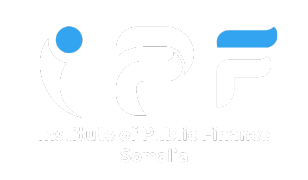IPF Centers
Center for the Study of Tax Law and Administration in Somalia
The Center for the Study of Tax Law and Administration will serve as a specialized institution focused on enhancing the understanding, implementation, and improvement of tax systems in Somalia. Drawing on international best practices, the center aims to promote effective tax policies, improve tax administration, and ensure equitable and transparent taxation that supports sustainable development.
Vision:
To become a leading center for the study and development of tax law and administration, advancing fiscal responsibility and promoting efficient taxation in Somalia.
Mission:
To provide in-depth research, policy advice, and training in tax law and administration, supporting the government and private sector in building a transparent, fair, and efficient tax system aligned with national development priorities.
Strategic Objectives:
-
Promote Fair and Transparent Taxation:
- Conduct research on tax equity and transparency to guide policymakers toward a fair tax system.
- Assess the impact of tax policies on businesses and individuals, focusing on economic inclusion.
-
Strengthen Legal and Administrative Frameworks for Taxation:
- Support the government in drafting and refining tax laws and regulations.
- Evaluate the performance of tax administration agencies and recommend reforms to enhance efficiency.
-
Facilitate Capacity Building and Training for Tax Professionals:
- Provide specialized courses on tax law, policy, and administration to government officials, legal professionals, and business leaders.
- Host workshops on topics such as VAT implementation, tax compliance, and audit procedures.
-
Foster Public Engagement and Awareness on Tax Issues:
- Promote public understanding of tax policies through publications and outreach campaigns.
- Engage with civil society, businesses, and the media to improve tax compliance and foster trust in the system.
Core Programs and Services:
-
Tax Law Research and Policy Advisory:
- Analyze existing tax laws and propose amendments to align them with evolving economic realities.
- Provide policy recommendations on tax incentives, exemptions, and emerging taxation challenges.
-
Tax Administration Performance Evaluation:
- Assess the effectiveness of tax collection mechanisms and identify areas for improvement.
- Develop key performance indicators (KPIs) to monitor the performance of tax authorities.
-
Training and Certification Programs:
- Offer certification programs in tax law and administration for public officials and private sector professionals.
- Design workshops and simulations to enhance tax compliance, auditing, and dispute resolution skills.
-
Public Awareness and Stakeholder Engagement:
- Publish tax guides and policy briefs to educate citizens on their tax obligations and rights.
- Organize forums and dialogues with stakeholders to promote transparent tax policies and increase compliance.
Governance and Operational Structure:
-
Advisory Committees: Include experts in law, finance, and public policy to guide key initiatives.
-
Program Divisions:
- Tax Law Research and Policy Advisory
- Tax Administration Monitoring and Reform
- Training and Public Engagement
Monitoring and Evaluation Framework:
-
Key Performance Indicators (KPIs):
- Number of tax professionals trained and certified annually.
- Improvement in tax compliance rates and reduction in tax disputes.
- Policy recommendations adopted by government agencies.
-
Annual Tax Policy and Administration Review:
- Provide a comprehensive analysis of tax policies and their socio-economic impact.
- Evaluate the effectiveness of tax administration reforms and recommend future improvements.
International Best Practices Adapted to Somalia’s Context:
-
Benchmarking Legal Frameworks with Regional Peers:
- Study the tax laws of neighboring countries to align Somalia’s legal framework with regional practices.
-
Digital Transformation of Tax Administration:
- Promote the adoption of digital tax systems

